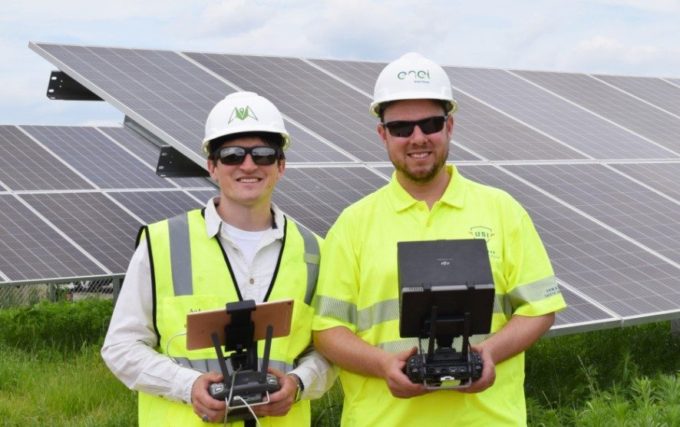Both Enel and Greentown Labs member Raptor Maps describe the start of their relationship as exceedingly “casual.” Neither anticipated that they’d ultimately partner to ensure the operation of Enel’s solar assets worldwide—they started just by testing out drones at an Enel solar farm.
But that experimentation with various data capture and analysis protocols resulted in a ten-fold improvement in inspection speed, issue identification, and overall efficiency. Those impressive outcomes and the informal relationship building that went along with it proved crucial, both companies say.
At a Fireside Chat this spring, Raptor Maps CEO Nikhil Vadhavkar and Enel Green Power North America’s Director of Innovation Sander Cohan shared the story of their partnership and offered advice for startups that want to collaborate with corporates. Enel is a Greentown partner, and its Boston Innovation Hub is headquartered at Greentown to facilitate collaboration with members like Raptor Maps.
Raptor Maps uses artificial intelligence and thermal imaging to pinpoint electrical issues, outages, damages, and obstructions (think dust, bird droppings, or overgrown trees) down to the exact solar panel. This type of information has become crucial as the solar industry grows globally.
Raptor Maps and Enel work together to manage real-time operations across the corporate’s solar portfolio.

“Raptor Maps solves a very fundamental problem by helping us automate and digitize a previously manual process,” Cohan told the Fireside Chat audience. “Enel maintains several dozen gigawatts of solar globally, and these are large facilities. What Raptor Maps’ process allows us to do is turn a days-long process into a minutes-long process.”
While they had already established informal relationships, their formal partnership began with the Massachusetts Clean Energy Center’s InnovateMass program. Through the program, Enel and Raptor did formal testing of the technology and Enel provided feedback on how the product could be most useful for their company.
When the InnovateMass opportunity arose, Raptor Maps and Enel’s prior relationship helped all the pieces fall into place.
“We knew exactly who to call and say, ‘Hey, we’ve got this idea, we think you guys are a really good partner, can we get this paperwork done and apply for this?’” Vadhavkar said.
For startups that are looking to collaborate with corporates, Vadhavkar advised that they should still work with smaller customers even while chasing a big partnership deal. This split strategy means that startups aren’t relying on corporate deals as a “lifeboat,” and that they can continue to iterate on their technology, meaning a better product for the target corporate.
Cohan emphasized the importance of patience and relationship building, explaining that a startup’s technology likely won’t be a perfect fit for a corporate initially, but that the two can grow together over time.
“The reason why we have an Innovation Hub at Greentown Labs is we want to be in constant exchange with companies in this ecosystem,” he said.
Check out a video on Enel and Raptor Maps’ partnership here!


